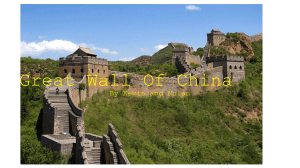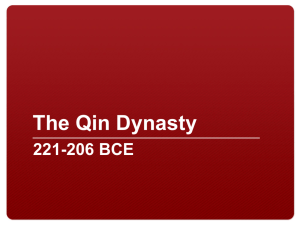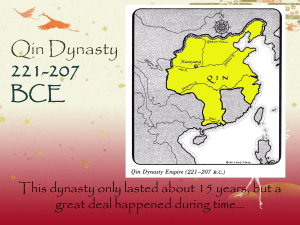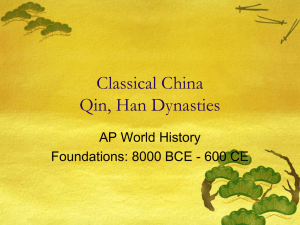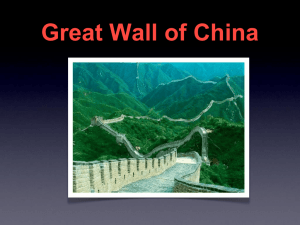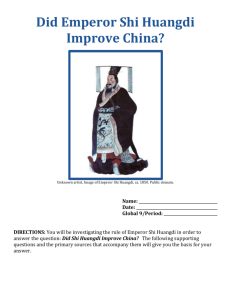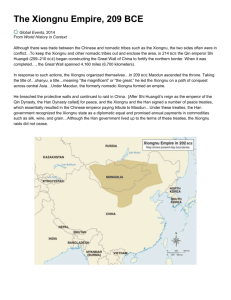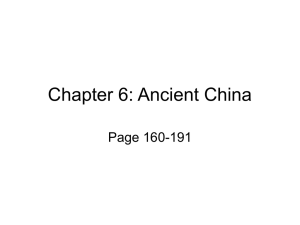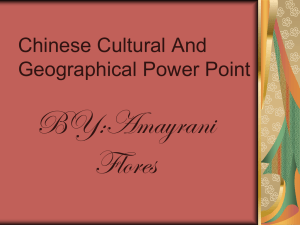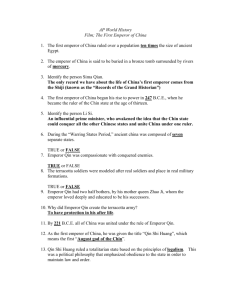Qin Dynasty
advertisement
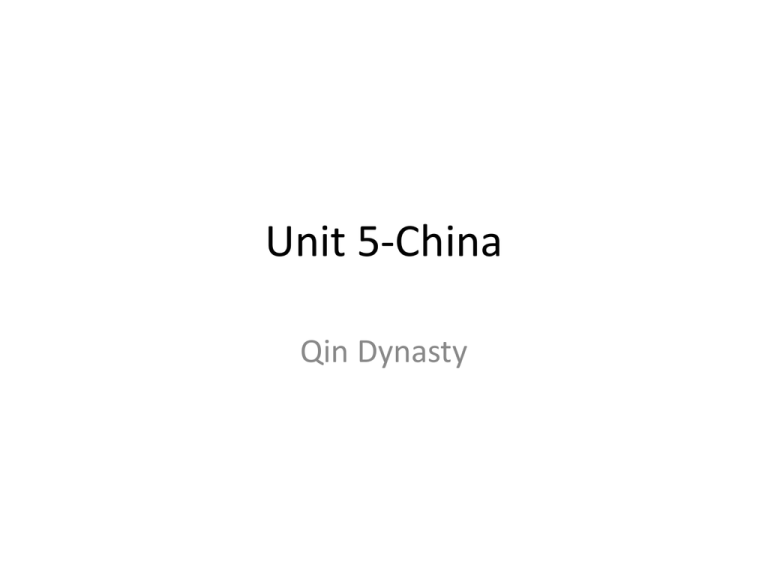
Unit 5-China Qin Dynasty Warm-Up • 1. Potty…don’t be late. • 2. Copy homework into agenda. • 3. Loose-leaf paper with heading and title – title is Ancient China Philosophies Review. Number 1 to 6. Thank You Zhou Dynasty Quiz A. Confucianism B. Daoism C. Legalism • • • • • 1. Strict rule with harsh punishments 2. “Go with the flow” 3. All power to the legal ruler 4. Be in harmony with nature 5. Practice what you preach/lead by example • 6. Respect for family, hard work and education Essential Questions 1. How did the Chinese dynasties (Qin) impact life in China? 2. How did the Chinese Philosophies impact life in China? What Do You Think? Qin Dynasty • The Warring States period marked a time in China when several states battled each other for power. One state, the Qin (chin), built a strong army that defeated the armies of the rivaling states. Eventually, the Qin Dynasty united the country under one government. Emperor Qin Shi Huangdi • In 221 BCE, the Qin king Ying Zheng succeeded in unifying China. He gave himself the title Shi Huangdi, which means “first emperor.” • Shi Huangdi followed Legalist political beliefs. He created a strong government with strict laws and harsh punishment. Policies • Strong government with strict laws. • Newly conquered lands would have city walls destroyed and weapons taken away to prevent revolts. • Standard laws – rules and punishments were to be the same in all parts of the empire • Standard writing system, money, and weights (to measure food and prevent cheating) throughout China would be the same. Education – books burned and scholars buried alive. • Shi Huangdi believed that uneducated people were easier to control and so the people should remain stupid so that they would never think to doubt who was in charge of the empire. • This policy resulted in the burning of books on a large scale and scholars being executed on a large scale. • Books were banned throughout the empire, as was teaching, except for subjects touching upon the re-written history of the Qin Dynasty, Legalism, or the personal glory of Shi Huangdi Achievements • Stopped fighting & Unified China. • Built network of roads and canals – transport: people, goods, and ideas. Every part of the empire was connected. This allowed the army to move quickly. • Built irrigation system to improve farming. Some are still used today. • Built the Great Wall across northern China to protect from the Mongols or Huns from the North….especially protect the Silk Road from thieves. Lasting Legacy - Qin Shi Huangdi wanted an army to watch over him in death. Altogether over 7,000 pottery soldiers, horses, chariots, and even weapons have been unearthed. Most of them have been restored to their former grandeur (glory or awesomeness). The Fall of the Qin • Shi Huangdi’s policies unified China. However, his policies also stirred resentment. Many peasants, scholars, and nobles hated his harsh ways. • After Qin’s death in 210 BCE, the government began to fall apart. • Rebel forces formed across the country. Each claimed to have received the Mandate of Heaven to replace the emperor. In 206 BCE, the capital city was captured and burned to the ground. Qin authority disappeared, the country fell into civil war. Essential Questions Review 1. How did the Chinese dynasties impact life in China? 2. How did the Chinese Philosophies impact life in China? What Do You think? Qin Shi Huang Di Independent Work – Choice #1 Do you think Qin Shi Huang di was a Hero or Villain? If you believe he was a Hero, design a commemorative plaque. If you believe he was a villain, design a “wanted” poster. Your plaque or poster must contain the following: 1. A title that indicates whether it is a commemorative plaque or a “wanted” poster 2. A picture or illustration of the emperor or his actions in life 3. At least three actions of the emperor that justify this plaque or poster, with illustrations for each action Independent Work – Choice #2 Rewrite History! Take the information you have learned on Emperor Qin and tell about his rule from your point-of-view on how you believe he should be remembered. Your history rewrite must contain the following: 1. A title that indicates the point-of-view of the rewrite. 2. A picture or illustration of the emperor or his actions in life. 3. At least three actions of the emperor that justify this point-of-view. 4. Be sure to use the appropriate adjectives to support your writing. Independent Work – Choice #3 Emperor Qin Shi Huang Di has returned and taken over the United States. He will naturally want to rule as he did as the emperor of the Qin Dynasty. You have been chosen as an advisor for Qin, and must decide three areas where changes will be made using Qin’s policies/achievements. In your advice letter to Emperor Qin you must include the following: • 1. At least three areas/ideas/policies that you feel need to be changed. • 2. Why they are changed? And what they are changed to? • 3. A picture or illustration of the emperor or his actions in the United States.
